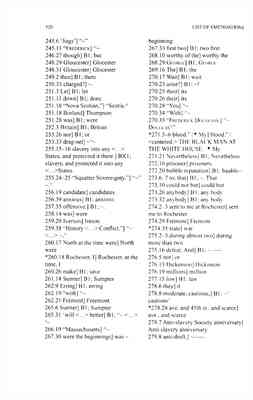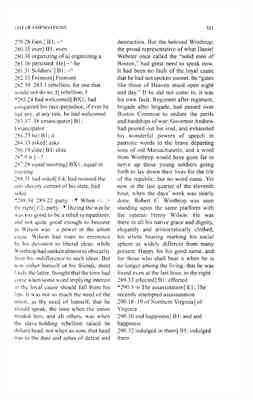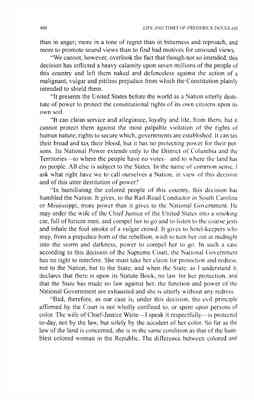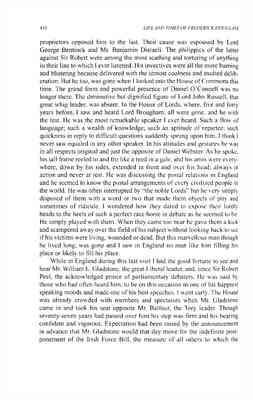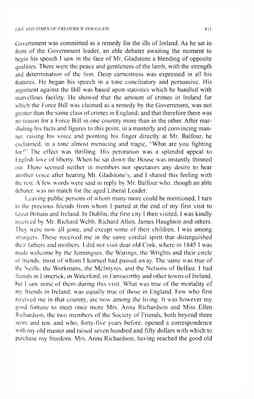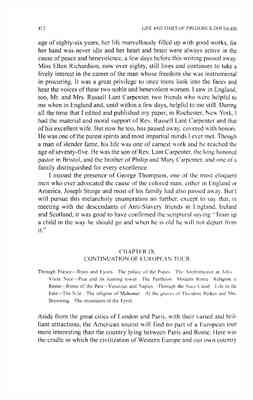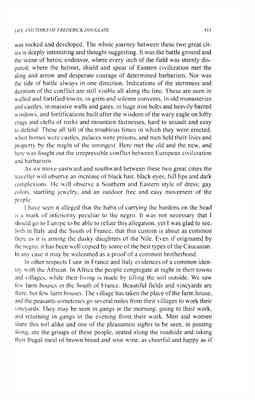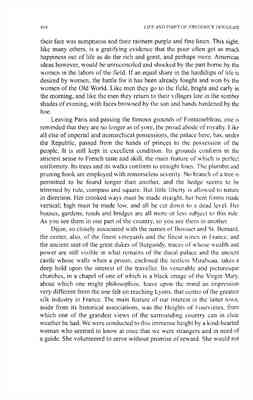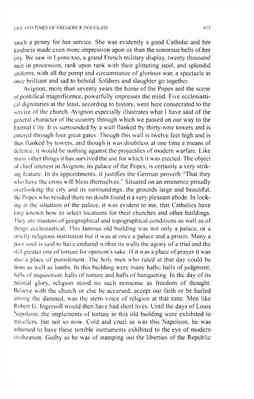Pages That Need Review
Editorial Emendations
8
520
245.6 'bags']"-" 245. J) " FREDERICK] "246.27 though] BI: but 248.29 Gloucester] Glocester 248.31 Gloucester] Glocester 249.2 then] Bl: there 250.33 charged')] -. 251.3 Let] BI: let 251. 11 down] BI : done 251.18 "Nova Scotian,") " Scotia," 251. 18 Borland] Thompson 251.28 was] BI: were 252.3 Britain J BI: Britian 253.26 nor] BI: or 253.33 drag-net]-"255.15-16 slavery into any < . .. > States, and protected it there. J BX I: slavery, and protected it into any < ... > States. 255.24- 25 "Squatter Sovereignty."]"-" I\
256.19 candidate J candidates 256.39 anxious] BI : anxions 257.35 offensive.] BI: -. 258.14 was] were 259.29 Iverson] Ireson 259.38 " History < . . .> Conflict,"] "< > -." 260. 17 North at the time were J North were *260.18 Rochester. I] Rochester. at the time. I 260.26 make] BI: save 261.14 SumterJ BI: Sumpter 262. 9 Erring] B 1: erring 262.19 " with] "262.21 Fremont] Freemon! 265.6 Sumter] BI : Sumpter 265.31 'will < .. .> better] BI: " - < ... > 266.19 "Massachusetts J "267 .30 were the beginnings] was -
LIST OF EMENDATIONS
beginning 267.33 first two] B 1: two first 268.10 worthy of the] worthy the 268.29 Grn1u;1] BI: GrnRCi E 269.16 The] BI: the 270.17 Wait] BI: wait 270.23 arise'1] BI: - 1 270.25 their] its 270.26 their] its 270.28 "You] " 270.34 "With) " 270.35 "FRrntRICK Dm<,L\SS. J " Dou<iLAs"" *271.5- 6 blood." i ~i My] blood." ! <centered: > THE BLACK MAN AT THE WHITE HO USE . ~- \1y 271.21 Ne, ertheless J BI: Ne, etheless 272.16 prisoner) pri soners 272.20 bubble reputation ) BI: bauble-273.6- 7 to: thatj Bl: - That 273.10 could not butj could but 273 .26 anybody] BI : any body 273 .32 anybodyj BI: any body 274 .2-3 sent to me at Rochester] sent me to Rochester 274.29 Fremont] Fremont *274.35 state J war 275 .2- 3 during almost two ] during more than two 275 . 16 defeat. And J BI: -.----276.5 nor] or 276.13 Dickenson J Dickinson 276.19 millions] mill,on 277 . 15 lo w] Bl: law 278.6 they] it 278 .8 moderate. cautious.] HI: - 1 cauti ons 1 *278 .28 ave . and 45th st.. and scarce) ave .. and scarce 279.7 Anti-slavery Society anniversary] Anti-slavery anniversary 279.8 anti-draft.] - --
9
LIST OF EMENDATIONS
521
279.28 Gen.] Bl ;-" 280.35 ever] Bl; even 280.38 organizing of a] organizing a 281. I6 persisted. He] -" he 281.3 I Soldiers'] BI;-" 282.15 Fremont] Fremont 282.39- 283 . 1 rebellion , for one that 11ould not do so. I) rebellion. I *283.24 had welcomed] BX I; had conquered his race-prejudice, if ever he had any: at any rate, he had welcomed 28.1J 7 -38 emancipator) BI: Emancipator 284.23 he J 81: it 2X-IJ3 asked] asks 2X6 .19dite] 81:clite 2x~ \J it] - ? 2X.., _28 equal meeting] BX I: equal in rne.:t i ng 2XXJ I had sided] FA: had resisted the anti-sla\ery current of his state. had mkd *2XX.34 289.22 party. ~ When < . .. > the right J 1:2: party. : •· During the war he 11 as too good to be a rebel sympathizer. and nnt quite good enough to become as \\ilson was- -a power in the union cwse. \\"ilson had risen to eminence hy his derntion to liberal ideas. while \\ mthrnp had sunken almost to obscurity frum his indifference to such ideas. But nuw either himself or his friends. most likely the latter. thought that the time had C\ll11e when some word implying interest 111 the loyal cause should fall from his lips. It 1\as not so much the need of the union. as the need of himself. that he should speak: the time when the union needed him. and all others. was when the sla\e-holding rebellion raised its defiant head. not when as now. that head 11 as in the dust and ashes of defeat and 1
destruction. But the beloved Winthrop, the proud representative of what Daniel Webster once called the "solid men of Boston," had great need to speak now. It had been no fault of the loyal cause that he had not spoken sooner. Its "gates like those of Heaven stood open night and day." If he did not come in, it was his own fault. Regiment after regiment, brigade after brigade, had passed over Boston Common to endure the perils and hardships of war; Governor Andrew had poured out his soul , and exhausted his wonderful powers of speech in patriotic \vords to the brave departing sons of old Massachusetts, and a word from Winthrop would have gone far to nef\ e up those young soldiers going forth to lay down their lives for the life of the republic : but no word came. Yet now in the last quarter of the eleventh hour. when the days' work was nearly done. Robert C. Winthrop was seen standing upon the same platform with the veteran Henry Wilson. He was there in all his native grace and dignity, elegantly and aristocratically clothed, hi s whole bearing marking his social sphere as widely different from many present. Happy for his good name, and for those who shall bear it when he is no longer among the living. that he was found even at the last hour, in the right 289.33 affected] BI: effected *290.5- 6 The assassination] EI: The recently attempted assassination 290.18- 19 of Northern Virginia] of Virginia 290.30 and happiness] BI: and and happiness 290.32 indulged in them] BI: indulged them
Line-End Hyphenation
1
Line-End Hyphenation in the Copy-Texts
At the ends of lines in the copy-texts appear the beginnings of compound words that, following hyphenation, continue in their spellings on the next line. Whether Frederick Douglass intended a hyphenated form of the word or an unhyphenated spelling is not determinable, given not only that the copy-texts do not include a representative sample of such choices in his own hand. Indeed, none of the copy-texts is a holograph, and in this instance there is no reliable way to distinguish between Douglass's preferences and those of his typist(s), editors, and compositors. Ineluctable, though, is the editorial necessity of rendering a decision on a "solid'' or hyphenated spelling, and the editors have elected to do so in the Yale edition by means of adopting the dominant form appearing in the copy-texts of Life and Times.
[left column] 4.7 co-laborers 4.32 self-development 5.18 twenty-three 5.38 slave-breeding 13.5 slave-holding 16.8 Railroad 16.33 steamship 19.20 anti-slavery 23.36 grandmother 24.10 grandchildren 25.20 grand-mamma 32.16 high-handed 32.28 grandmother's 33.18 turkey-houses 34.26 blacksmith 35.39 head-ship 36.1 store-houses 40.4 heart-rending 40.34 overseer 42.28 overpowered 43.3 freeman 43.10 death-bed 46.30 Fault-finding 47.6 painstaking 47.22 overlooked 48.25 health-seeking
[right column] 51.25 handcuffed 52.7 overseer 52.13 overseer 52.22 overseer 52.27 overseer 56.7 forehead 58.32-33 shooting-crackers 61.16 kind-hearted 64.15 slaveholder 67.12 heart-searching 67.13 slaveholder 70.25 slaveholding 71.5 slaveholders 73.8 starboard 73.10-11 starboard 75.9 pathway 78.12 grandmother 79.2 slaveholder 81.11-12 awe-struck 81.26 Slaveholders 83.13 slaveholder 85.19 slaveholder 85.22 hard-heartedness 87.2 Sabbath-school 87.24 class-leaders 90.29 life-long
531
Life and Times, Third Part
26
400 LIFE AND TIMES OF FREDERICK DOUGLASS
than in anger; more in a tone of regret than in bitterness and reproach, and more to promote sound views than to find bad motives for unsound views.
"We cannot, however, overlook the fact that though not so intended, this decision has inflicted a heavy calamity upon seven millions of the people of this country and left them naked and defenceless against the action of a malignant, vulgar and pitiless prejudice from which the Constitution plainly intended to shield them.
"It presents the United States before the world as a Nation utterly destitute of power to protect the constitutional rights of its own citizens upon its own soil.
"It can claim service and allegiance, loyalty and life, from them, but it cannot protect them against the most palpable violation of the rights of human nature; rights to secure which, governments are established. It can tax their bread and tax their blood, but it has no protecting power for their persons. Its National Power extends only to the District of Columbia and the Territories–to where the people have no votes– and to where the land has no people. All else is subject to the States. In the name of common sense. I ask what right have we to call ourselves a Nation, in view of this decision and of this utter destitution of power?
"In humiliating the colored people of this country, this decision has humbled the Nation. It gives, to the Rail-Road Conductor in South Carolina or Mississippi, more power than it gives to the National Government. He may order the wife of the Chief Justice of the United States into a smoking car, full of hirsute men, and compel her to go and to listen to the coarse jests and inhale the foul smoke of a vulgar crowd. It gives to hotel-keepers who may, from a prejudice born of the rebellion, wish to turn her out at midnight into the storm and darkness, power to compel her to go. In such a case according to this decision of the Supreme Court, the National Government has no right to interfere. She must take her claim for protection and redress, not to the Nation, but to the State; and when the State, as I understand it, declares that there is upon its Statute Book, no law for her protection, and that the State has made no law against her, the function and power of the National Government are exhausted and she is utterly without any redress.
"Bad, therefore, as our case is, under this decision, the evil principle affirmed by the Court is not wholly confined to, or spent upon persons of color. The wife of Chief-Justice Waite – I speak it respectfully – is protected to-day, not by the law, but solely by the accident of her color. So far as the law of the land is concerned, she is in the same condition as that of the humblest colored woman in the Republic. The difference between colored and
36
410 LIFE AND TIMES OF FREDERICK DOUGLASS
proprietors opposed him to the last. Their cause was espoused by Lord George Bentinck and Mr. Benjamin Disraeli. The philippics of the latter against Sir Robert were among the most scathing and torturing of anything in their line to which I ever listened. His invectives were all the more burning and blistering because delivered with the utmost coolness and studied deliberation. But he too, was gone when I looked into the House of Commons this time. The grand form and powerful presence of Daniel O'Connell was no longer there. The diminutive but dignified figure of Lord John Russell, that great whig leader, was absent. In the House of Lords, where, five and forty years before, I saw and heard Lord Brougham, all were gone, and he with the rest. He was the most remarkable speaker I ever heard. Such a flow of language; such a wealth of knowledge; such an aptitude of repartee; such quickness in reply to difficult questions suddenly sprung upon him. I think I never saw equaled in any other speaker. In his attitudes and gestures he was in all respects original and just the opposite of Daniel Webster. As he spoke, his tall frame reeled to and fro like a reed in a gale, and his arms were everywhere, down by his sides, extended in front and over his head; always in action and never at rest. He was discussing the postal relations in England and he seemed to know the postal arrangements of every civilized people in the world. He was often interrupted by "the noble Lords" but he very simply disposed of them with a word or two that made them objects of pity and sometimes of ridicule. I wondered how they dared to expose their lordly heads to the heels of such a perfect race horse in debate as he seemed to be. He simply played with them. When they came too near he gave them a kick and scampered away over the field of his subject without looking back to see if his victims were living, wounded or dead. But this marvelous man though he lived long, was gone and I saw in England no man like him filling his place or likely to fill his place.
While in England during this last visit I had the good fortune to see and hear Mr. William E. Gladstone, the great Liberal leader, and, since Sir Robert Peel, the acknowledged prince of parliamentary debaters. He was said by those who had often heard him, to be on this occasion in one of his happiest speaking moods and made one of his best speeches. I went early. The House was already crowded with members and spectators when Mr. Gladstone came in and took his seat opposite Mr. Balfour, the Tory leader. Though seventy-seven years had passed over him his step was firm and his bearing confident and vigorous. Expectation had been raised by the announcement in advance that Mr. Gladstone would that day move for the indefinite postponement of the Irish Force Bill, the measure of all others to which the
37
LIFE AND TIMES OF FREDERICK DOUGLASS 411
Government was committed as a remedy for the ills of Ireland. As he sat in front of the Government leader, an able debater awaiting the moment to begin his speech I saw in the face of Mr. Gladstone a blending of opposite qualities. There were the peace and gentleness of the lamb, with the strength and determination of the lion. Deep earnestness was expressed in all his features. He began his speech in a tone conciliatory and persuasive. His argument against the Bill was based upon statistics which he handled with marvellous facility. He showed that the amount of crimes in Ireland for which the Force Bill was claimed as a remedy by the Government, was not greater than the same class of crimes in England; and that therefore there was no reason for a Force Bill in one country more than in the other. After marshaling his facts and figures to this point, in a masterly and convincing manner, raising his voice and pointing his finger directly at Mr. Balfour, he exclaimed, in a tone almost menacing and tragic, "What are you fighting for?" The effect was thrilling. His peroration was a splendid appeal to English love of liberty. When he sat down the House was instantly thinned out. There seemed neither in members nor spectators any desire to hear another voice after hearing Mr. Gladstone's, and I shared this feeling with the rest. A few words were said in reply by Mr. Balfour who, though an able debater, was no match for the aged Liberal Leader.
Leaving public persons of whom many more could be mentioned, I turn to the precious friends from whom I parted at the end of my first visit to Great Britain and Ireland. In Dublin, the first city I then visited, I was kindly received by Mr. Richard Webb, Richard Allen, James Haughton and others. They were now all gone, and except some of their children, I was among strangers. These received me in the same cordial spirit that distinguished their fathers and mothers. I did not visit dear old Cork, where in 1845 I was made welcome by the Jenningses, the Warings, the Wrights and their circle of friends, most of whom l learned had passed away. The same was true of the Neills, the Workmans, the McIntyres, and the Nelsons of Belfast. I had friends in Limerick, in Waterford, in Enniscorthy and other towns of Ireland, hut l saw none of them during this visit. What was true of the mortality of my friends in Ireland, was equally true of those in England. Few who first received me in that country, are now among the living. It was however my good fortune to meet once more Mrs. Anna Richardson and Miss Ellen Richardson, the two members of the Society of Friends, both beyond three score and ten, and who, forty-five years before, opened a correspondence with my old master and raised seven hundred and fifty dollars with which to purchase my freedom. Mrs. Anna Richardson, having reached the good old
38
LIFE AND TIMES OF FREDERICK DOUGLASS 412
age of eighty-six years, her life marvellously filled up with good works, for her hand was never idle and her heart and brain were always active in the cause of peace and benevolence, a few days before this writing passed away. Miss Ellen Richardson, now over eighty, still lives and continues to take a lively interest in the career of the man whose freedom she was instrumental in procuring. It was a great privilege to once more look into the faces and hear the voices of these two noble and benevolent women. I saw in England, too, Mr. and Mrs. Russell Lant Carpenter, two friends who were helpful to me when in England and, until within a few days, helpful to me still. During all the time that I edited and published my paper, in Rochester, New York, I had the material and moral support of Rev. Russell Lant Carpenter and that of his excellent wife. But now he too, has passed away, covered with honors. He was one of the purest spirits and most impartial minds I ever met. Though a man of slender fame, his life was one of earnest work and he reached the age of seventy-five. He was the son of Rev. Lant Carpenter, the long honored pastor in Bristol, and the brother of Philip and Mary Carpenter, and one of a family distinguished for every excellence.
I missed the presence of George Thompson, one of the most eloquent men who ever advocated the cause of the colored man, either in England or America. Joseph Sturge and most of his family had also passed away. But I will pursue this melancholy enumeration no further, except to say that, in meeting with the descendants of Anti-Slavery friends in England, Ireland and Scotland, it was good to have confirmed the scriptural saying "Train up a child in the way he should go and when he is old he will not depart from it."
CHAPTER IX. CONTINUATION OF EUROPEAN TOUR.
Through France– Dijon and Lyons– The palace of the Popes– The Ampitheater at Arles Visits Nice– Pisa and its leaning tower– The Pantheon– Modern Rome– Religion at Rome– Rome of the past– Vesuvius and Naples– Through the Suez Canal– Life in the East– The Nile– The religion of Mahomet– At the graves of Theodore Parker and Mrs. Browning– The mountains of the Tyrol.
Aside from the great cities of London and Paris, with their varied and brilliant attractions, the American tourist will find no part of a European tour more interesting than the country lying between Paris and Rome. Here was the cradle in which the civilization of Western Europe and our own country
39
LIFE AND TIMES OF FREDERICK DOUGLASS 413
was rocked and developed. The whole journey between these two great cities is deeply interesting and thought suggesting. It was the battle ground and the scene of heroic endeavor, where every inch of the field was sternly disputed; where the helmet, shield and spear of Eastern civilization met the sling and arrow and desperate courage of determined barbarism. Nor was the tide of battle always in one direction. Indications of the sternness and duration of the conflict are still visible all along the line. These are seen in walled and fortified towns, in grim and solemn convents, in old monasteries and castles, in massive walls and gates, in huge iron bolts and heavily barred windows, and fortifications built after the wisdom of the wary eagle on lofty crags and clefts of rocks and mountain fastnesses, hard to assault and easy to detend. These all tell of the troublous times in which they were erected, when homes were castles, palaces were prisons, and men held their lives and property by the might of the strongest. Here met the old and the new, and here was fought out the irrepressible conflict between European civilization and barbarism.
As we move eastward and southward between these two great cities the traveller will observe an increase of black hair, black eyes, full lips and dark complexions. He will observe a Southern and Eastern style of dress; gay colors, startling jewelry, and an outdoor free and easy movement of the people.
I have seen it alleged that the habit of carrying the burdens on the head is a mark of inferiority peculiar to the negro. It was not necessary that I should go to Europe to be able to refute this allegation, yet I was glad to see, both in Italy and the South of France, that this custom is about as common there as it is among the dusky daughters of the Nile. Even if originated by the negro, it has been well copied by some of the best types of the Caucasian. In any case it may be welcomed as a proof of a common brotherhood.
In other respects I saw in France and Italy evidences of a common identity with the African. In Africa the people congregate at night in their towns and villages, while their living is made by tilling the soil outside. We saw few farm houses in the South of France. Beautiful fields and vineyards are there, but few farm houses. The village has taken the place of the farm house, and the peasants sometimes go several miles from their villages to work their vineyards. They may be seen in gangs in the morning, going to their work, and returning in gangs in the evening from their work. Men and women share this toil alike and one of the pleasantest sights to be seen, in passing along, are the groups of these people, seated along the roadside and taking their frugal meal of brown bread and sour wine, as cheerful and happy as if
40
414 LIFE AND TIMES OF FREDERICK DOUGLASS
their fare was sumptuous and their raiment purple and fine linen. This sight, like many others, is a gratifying evidence that the poor often get as much happiness out of life as do the rich and great, and perhaps more. American ideas however, would be unreconciled and shocked by the part borne by the women in the labors of the field. If an equal share in the hardships of life is desired by women, the battle for it has been already fought and won by the women of the Old World. Like men they go to the field, bright and early in the morning, and like the men they return to their villages late in the somber shades of evening, with faces browned by the sun and hands hardened by the hoe.
Leaving Paris and passing the famous grounds of Fontainebleau, one is reminded that they are no longer as of yore, the proud abode of royalty. Like all else of imperial and monarchical possessions, the palace here, has, under the Republic, passed from the hands of princes to the possession of the people. It is still kept in excellent condition. Its grounds conform in the strictest sense to French taste and skill, the main feature of which is perfect uniformity. Its trees and its walks conform to straight lines. The plumbit and pruning hook are employed with remorseless severity. No branch of a tree is permitted to be found longer than another, and the hedge seems to be trimmed by rule, compass and square. But little liberty is allowed to nature in direction. Her crooked ways must be made straight, her bent forms made vertical; high must be made low, and all be cut down to a dead level. Her houses, gardens, roads and bridges are all more or less subject to this rule. As you see them in one part of the country, so you see them in another.
Dijon, so closely associated with the names of Bossuet and St. Bernard; the center, also, of the finest vineyards and the finest wines in France, and the ancient seat of the great dukes of Burgundy, traces of whose wealth and power are still visible in what remains of the ducal palace and the ancient castle whose walls when a prison, enclosed the restless Mirabeau, takes a deep hold upon the interest of the traveller. Its venerable and picturesque churches, in a chapel of one of which is a black image of the Virgin Mary, about which one might philosophize, leave upon the mind an impression very different from the one felt on reaching Lyons, that center of the greatest silk industry in France. The main feature of our interest in the latter town, aside from its historical associations, was the Heights of Fourvicres, from which one of the grandest views of the surrounding country can in clear weather be had. We were conducted to this immense height by a kind-hearted woman who seemed to know at once that we were strangers and in need of a guide. She volunteered to serve without promise of reward. She would not
41
LIFE AND TIMES OF FREDERICK DOUGLASS 415
touch a penny for her service. She was evidently a good Catholic and her kindness made even more impression upon us than the sonorous bells of her city. We saw in Lyons too, a grand French military display, twenty thousand men in procession, rank upon rank with their glittering steel, and splendid uniform, with all the pomp and circumstance of glorious war, a spectacle at once brilliant and sad to behold. Soldiers and slaughter go together.
Avignon, more than seventy years the home of the Popes and the scene of pontifical magnificence, powerfully impresses the mind. Five ecclesiastical dignitaries at the least, according to history, were here consecrated to the service of the church. Avignon especially illustrates what I have said of the general character of the country through which we passed on our way to the Eternal City. It is surrounded by a wall flanked by thirty-nine towers and is entered through four great gates. Though this wall is twelve feet high and is thus flanked by towers, and though it was doubtless at one time a means of defence, it would be nothing against the projectiles of modem warfare. Like many other things it has survived the use for which it was erected. The object of chief interest in Avignon, its palace of the Popes, is certainly a very striking feature. In its appointments, it justifies the German proverb "That they who have the cross will bless themselves." Situated on an eminence proudly overlooking the city and its surroundings, the grounds large and beautiful, the Popes who resided there no doubt found it a very pleasant abode. In looking at the situation of the palace, it was evident to me, that Catholics have long known how to select locations for their churches and other buildings. They are masters of geographical and topographical conditions as well as of things ecclesiastical. This famous old building was not only a palace, or a strictly religious institution but it was at once a palace and a prison. Many a poor soul is said to have endured within its walls the agony of a trial and the still greater one of torture for opinion's sake. If it was a place of prayer it was also a place of punishment. The holy men who ruled at that day could be lions as well as lambs. In this building were many halls: halls of judgment; halls of inquisition; halls of torture and halls of banqueting. In the day of its palatial glory, religion stood no such nonsense as freedom of thought. Believe with the church or else be accursed; accept our faith or be hurled among the damned, was the stern voice of religion at that time. Men like Robert G. Ingersoll would then have had short lives. Until the days of Louis Napoleon, the implements of torture in this old building were exhibited to travellers, but not so now. Cold and cruel as was this Napoleon, he was ashamed to have these terrible instruments exhibited to the eye of modem civilization. Guilty as he was of stamping out the liberties of the Republic
